|
|
|
Sort Order |
|
|
|
Items / Page
|
|
|
|
|
|
|
| Srl | Item |
| 1 |
ID:
173230
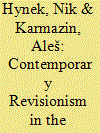

|
|
|
|
|
| Summary/Abstract |
In opening this special issue, our conceptual essay reclaims the importance of revisionism for regional analysis. It identifies and offers key conceptual and analytical tools for a multifaceted analysis of revisionism, discussing its various forms in relation to the aims and risk propensity of a given country. As a transdisciplinary and theoretical eclecticism, dilemma analysis is utilised to bridge the divide between political science, international relations, and security studies. To ascertain the extent of revisionism, we offer and operationalise six dilemmas seen as central for grasping its contemporary parameters: political order, political regimes, technology, migration, the economy, and the international system.
|
|
|
|
|
|
|
|
|
|
|
|
|
|
|
|
| 2 |
ID:
099512
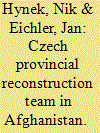

|
|
|
|
|
| Publication |
2010.
|
| Summary/Abstract |
This article is an empirical-theoretical mapping of the Czech participation in the peacebuilding reconstruction of Afghanistan in the form of the Czech Provincial Reconstruction Team (PRT). As will become clear, an important part of such a study is a focus on the analysis of the influence of the security context and external factors on the participation and form of the Czech PRT. The study is divided into two basic parts. The first part gives the reader a necessary and sensible grounding. Specifically, it presents a contextual frame for the participation of the North Atlantic Treaty Organization (NATO) in Afghanistan. What then follows is an analysis of the domestic political debate in the Czech Republic. One of the findings is that any proper domestic political debate was absent, instead there was a polarization of the relationship between the government of the Czech Republic and the parliamentary opposition on the issue of the Czech PRT Logar. The article concludes with a question concerning the motives of the Czech government for sending the Czech PRT into Afghanistan.
|
|
|
|
|
|
|
|
|
|
|
|
|
|
|
|
| 3 |
ID:
112736
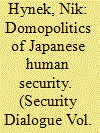

|
|
|
|
|
| Publication |
2012.
|
| Summary/Abstract |
Japan's approach to human security has commonly been regarded as progressive, imbued with liberal internationalist commitment. In this article, I offer an alternative and critical perspective on Japanese human security, arguing that the mainstream understanding neglects some important features of the phenomenon. I pay attention to the tight links between Japanese discourses and practices of international development and humanitarian assistance, refugee policy, counter-terrorism, and NGO regulation. So far, these issue areas have only been examined separately in the literature, thereby obscuring the strong affinities of human security to national security and non-liberal bureaucratic control. I argue that once the international and the domestic sides of Japanese human security are studied together, the approach can no longer be understood as resting on a combination of liberal values and 'Asian' values. Instead, it needs to be studied through a domopolitical diagram concerned with national security - that is, governance in the image of the home, linking citizenship, state and territory. After an initial discussion of the notion of domopolitics and its conceptual extension to the Japanese context, the article investigates the domopolitical relationship between Japanese human security as practised in Afghanistan and Japan's domestic refugee policy. It continues by examining the emergence of juridico-bureaucratic administration of NGOs within the domestic context and its subsequent extension to the area of Japanese human security, before ending with a few concluding remarks.
|
|
|
|
|
|
|
|
|
|
|
|
|
|
|
|
| 4 |
ID:
103198
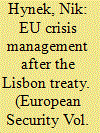

|
|
|
|
|
| Publication |
2011.
|
| Summary/Abstract |
The presented article focuses on key issues and developments in the European Union (EU)'s comprehensive crisis management planning, civil-military coordination and cooperation, as well as the future of the EU Operational Headquarters (OHQ). The article begins with a short overview of key changes in the EU's external action after the Lisbon Treaty, and focuses on the area of Common Foreign and Security Policy (CFSP) and Common Security and Defence Policy (CSDP). The impact of the European External Action Service on CSDP-CFSP cooperation in planning and on EU's crisis management is being examined. Further on, the article continues by addressing the issue area of EU crisis management. After the evolution of the concept and practice at the EU level is examined and different phases are discussed, the article analyses the main political, strategic and operational trends in this field. Indeed, this part reflects on the implications of the Lisbon Treaty for crisis management. What follows is an assessment of the civil-military coordination in the EU's crisis management structures. In order to contextualise the most recent transformations that are investigated at length, basic concepts and terms are outlined, and the evolution of civil-military coordination at the EU level is presented. The final substantive part tackles current and future EU OHQ options. After the necessary contextualisation, the characteristics and shortcomings of the three current options are analysed, and based on these limits, the case for the establishment of a permanent strategic planning and conduct structure in Brussels is put forward. Finally, concluding remarks and recommendations are attached.
|
|
|
|
|
|
|
|
|
|
|
|
|
|
|
|
| 5 |
ID:
115326


|
|
|
|
|
| Publication |
2012.
|
| Summary/Abstract |
This article investigates the performance of Poland and the Czech Republic in the US-led regime change wars in Iraq and Afghanistan. The article indicates a significant gap between the Czech and Polish discourses and practices related to the two countries' contributions. In the two crises, discourses revolved around the notion of universal values and support for legal and legitimate peace support operations mandated by the UN. But the practices did not match those discourses and were actually driven by the beliefs that form the Atlanticist ideology. The article analyses the successful internalization of US discourses and threat perception in Poland and the Czech Republic through the use of 'cascade argumentation'. The practical results of this internalization are then examined.
|
|
|
|
|
|
|
|
|
|
|
|
|
|
|
|
| 6 |
ID:
094587


|
|
|
| 7 |
ID:
171142
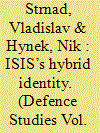

|
|
|
|
|
| Summary/Abstract |
This paper analyses the means, degree, and strategic significance of the Islamic State’s (ISIS) self-representation simultaneously as a state-like entity and a terrorist organisation. We explore how ISIS strategically used the content of its propagandist magazine Dabiq to spin its dual – or hybrid – identity, with the aim of broadening its propagandist reach. ISIS’s discursive crossfading between an aspiring, state-like territorial actor and a networked, terrorist group was the central part of its ability to mesmerise multiple audiences simultaneously. The hybrid self-representation is first contextualised vis-à-vis existing academic analyses of ISIS’s magazine Dabiq and its depiction of ISIS. Then we discuss our original thematic analysis of ISIS’s narrative features and dynamics across all existing Dabiq issues. Through abduction, we identified six themes: three presenting ISIS as a state and three as a terrorist organisation. Subsequent triangulation of these themes offers a novel contribution to the academic literature and allows us to show how ISIS attempted to maintain a state-like image to increase its radicalisation potential.
|
|
|
|
|
|
|
|
|
|
|
|
|
|
|
|
| 8 |
ID:
110310


|
|
|
|
|
| Publication |
2012.
|
| Summary/Abstract |
This article examines the fortunes of Japanese governmental discourses and practices related to the country's international involvement in its two types of peace delivery: peace support operations and human security. The first part of the article analyses Japan's security push into (post-)conflict spaces. It is argued that in the Japanese case more than in any other, the profound separation of the military from the rest of the state apparatus has been responsible for the country's inability to bridge peacekeeping and peace-enforcement practices with human security. The second part deals with the consequences of Japan's parallel bureaucratic delivery of peace and specifically with the eventual phasing out of the Japanese military in these efforts. Thus, the analysis suggests that Japan has undergone a rebalancing of the thrust of its peace support activities in a direction similar to the previously popular chequebook diplomacy.
|
|
|
|
|
|
|
|
|
|
|
|
|
|
|
|
| 9 |
ID:
099569


|
|
|
|
|
| Publication |
2010.
|
| Summary/Abstract |
In recent considerations of deterrence in strategic studies, there are almost no works that would systematically link deterrence to one of the most important current issue areas of contemporary strategic studies: ballistic missile defence (BMD). In an attempt to address this lacuna, this article considers ways in which missile defence has been - and can be - intertwined with deterrence of the 21st century. The article begins with a historical outline of the relationship between nuclear deterrence and BMD, and continues by comparing and contrasting US political and strategic-planning discourses in how they have addressed the examined relationship. What follows is the recasting of traditional understanding of deterrence as a set of disparate modalities underpinned by different principles and organizing logics. The article will show the role and function of BMD in three relevant modalities of deterrence in the 21st century: first, in a renewed strategic deterrence between the USA and Russia based on an axiomatic logic of MAD; second, in the deterrence of rogue states in reaction to their asymmetric nuclear threats; and, finally, in a reverse deterrence from intervention in regional conflicts. Consequently, the presented outline of the three modalities will be theoretically furthered to allow for conceptualization of possible links to BMD in ways in which practical implications for future research, strategic planning and political action can be seen.
|
|
|
|
|
|
|
|
|
|
|
|
|
|
|
|
| 10 |
ID:
173229


|
|
|
| 11 |
ID:
173231
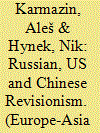

|
|
|
|
|
| Summary/Abstract |
The essay investigates the revisionism of great powers, namely Russia, the United States and China. We study intermestic configurations, linking domestic populism, the presidential power of national leaders as expressed by their strategic narratives, and each state’s international revisionist posture. In each case, we identify a different style of revisionism: Russia’s ‘guerrilla’ great power revisionism, the Trumpian anti-doctrine revisionism, and China’s revisionist quest for power and status. We argue that the different revisionist trajectories of these great powers contribute to the multifaceted and uneven unmaking of global liberal internationalism and liberal norms rather than to a coherent revisionist challenge.
|
|
|
|
|
|
|
|
|
|
|
|
|
|
|
|
| 12 |
ID:
096851
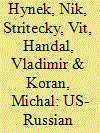

|
|
|
|
|
| Publication |
2009.
|
| Summary/Abstract |
The article examines the reactions of selected European states to the US-performed 'reset' in relations with Russia and explores the ways in which they have been adapting to the new set-up. The article is divided into three parts: after the discussion of the substantive continuity and limited change in US foreign and security policy (USFSP), the multilateral and bilateral dimensions of USFSP procedure are examined through John Ruggie's theoretical observations. The second part of the article deals with implications of the USFSP for Central-Eastern European countries. This part begins with a discussion of Russian attempts to wheedle Europe into embracing its plans for new European security architecture. The next section sheds light on the unexpected process of strategic realignment of the region (USA/NATO/EU/CSDP) and simultaneous transformation of the special relationship with the USA into 'normal life'. The third part of the article tackles the implications of heightened US-Russian bilateralism for Germany. Authors' findings, many of them based on conducted elite interviews, suggest the contrary process, namely Germany's strengthened multilateral commitment to the EU and specifically to European Security and Defence Policy, limiting the bilateral option to energy trade with Russia. What follows are concluding remarks.
|
|
|
|
|
|
|
|
|
|
|
|
|
|
|
|
| 13 |
ID:
116325
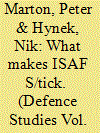

|
|
|
|
|
| Publication |
2012.
|
| Summary/Abstract |
The presented article conceptualises the issue of over- and under-contribution in coalition operations; that of how and why members of complex coalitions may be punching above and below their weight, respectively. The first section presents a parsimonious baseline assumption regarding what variables may fundamentally inform coalition burden-sharing, to subsequently discuss how much each of these are found to play a role in the context of the ISAF (International Security Assistance Force) mission in Afghanistan. The second section elaborates on this by assessing the perception and the interpretation of threats by coalition members countries, related to Afghanistan. The third and fourth sections then proceed to examine and further enrich the existing literature on coalition burden-sharing, and provide further insights regarding the ISAF operation,. Preliminary findings are presented in the fifth section where we offer raw evidence of the relevance of our baseline assumptions. In the sixth section, we present integrated models of the key variables that play a role in shaping coalition contributions, and here two key periods form the focus of this study. On the one hand, we focus on the period of ISAF's cross-country involvement in Afghanistan, following ISAF's expansion of its operations to the south of Afghanistan in mid- 2006, up to mid-2011. Subsequently, we draw conclusions as to how the distribution of countries with different approaches or "commitment postures" may have affected Afghanistan strategy and developments on the ground in the context of the ongoing insurgencies. In the final section, we refine our initial baseline assumptions and the hypothesised country profiles which were based on the latter, with reference to a recently published collection of country case studies by a team of scholars.
|
|
|
|
|
|
|
|
|
|
|
|
|
|
|
|
|
|
|
|
|